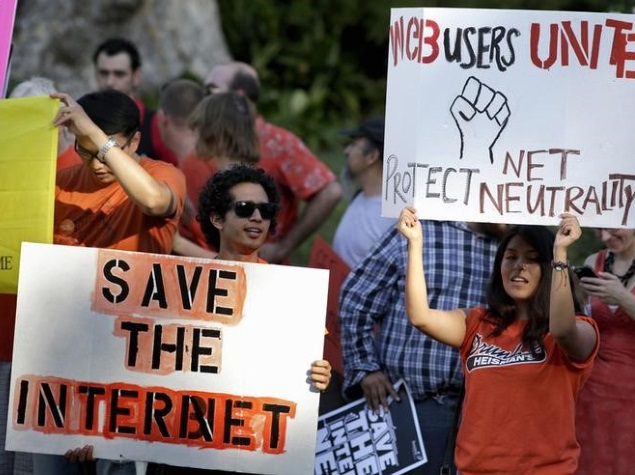- Home
- Telecom
- Telecom News
- US FCC Chief Presses Experts on Mobile 'Net Neutrality' Rules
US FCC Chief Presses Experts on Mobile 'Net Neutrality' Rules

The issue is at the heart of a debate over whether the FCC should undo exemptions applied to mobile carriers as it rewrites Internet traffic regulations, after an appeals court rejected its 2010 rules in January.
Consumer advocates and wireless industry experts discussed the question of parity between wireless and wireline networks at one of several roundtables called by Wheeler to get "from heat to light" on so-called net neutrality rules.
(Also see: US FCC Stops Accepting Net Neutrality Comments; to Continue Outreach)
Public interest groups and web companies, including Google Inc and Facebook Inc, say the FCC should impose similar antidiscrimination rules for wireless companies and wireline ISPs.
Under earlier rules, all ISPs were banned from blocking users' access to websites, but wireless providers were only banned from blocking applications that competed with their own voice or video calling services. Wireline ISPs could not block or "unreasonably discriminate" against any applications.
Christopher Guttman-McCabe, vice president for regulatory affairs at wireless association CTIA, stressed that wireless networks differed by being shared and more dynamic than wireline ones. He said "a radical change" to mobile net neutrality rules to create parity threatened the wireless networks with poorer consumer experiences and less investment in innovation.
"Chris, I can't accept your 'hell will freeze over' analogy," said Wheeler, who ran the CTIA from 1992 to 2004 before becoming a venture capitalist.
Wheeler urged the panel to instead focus on what "reasonable network management" should mean, citing a recent comment by Verizon Communications Inc CEO Lowell McAdam as showing the largest wireless carrier was already committed to abiding by net neutrality parity.
Verizon's vice president for federal regulatory affairs, David Young, said Verizon had no problem delivering the open Internet connections that its customers expect.
"To the extent that the FCC moves forward with reasonable rules that recognize the differences between wireline and wireless, we're likely to be able to satisfy them with the way that we provide our services," he said.
Wireless and consumer interest representatives agreed that mobile networks technologically differed from wired networks, but disagreed on the extent to which wireless ISPs should be restricted in "reasonable network management."
"We appreciate that there are operational challenges, I just don't think that's a carte blanche for carriers" to hurt consumers, said Delara Derakhshani of the Consumers Union.
U.S. consumers, particularly minorities, increasingly rely on mobile phones for Internet access, prompting Wheeler to underscore in a recent speech that the agency has "specifically recognized that there have been significant changes in the mobile marketplace since 2010."
It is unclear to what extent Wheeler is prepared to regulate wireless net neutrality.
"Although I continue to keep an open mind, I must say that I have concerns about a lower, a possible lower standard for mobile services," FCC Commissioner Mignon Clyburn said on Tuesday.
© Thomson Reuters 2014
Catch the latest from the Consumer Electronics Show on Gadgets 360, at our CES 2026 hub.
Related Stories
- Samsung Galaxy Unpacked 2025
- ChatGPT
- Redmi Note 14 Pro+
- iPhone 16
- Apple Vision Pro
- Oneplus 12
- OnePlus Nord CE 3 Lite 5G
- iPhone 13
- Xiaomi 14 Pro
- Oppo Find N3
- Tecno Spark Go (2023)
- Realme V30
- Best Phones Under 25000
- Samsung Galaxy S24 Series
- Cryptocurrency
- iQoo 12
- Samsung Galaxy S24 Ultra
- Giottus
- Samsung Galaxy Z Flip 5
- Apple 'Scary Fast'
- Housefull 5
- GoPro Hero 12 Black Review
- Invincible Season 2
- JioGlass
- HD Ready TV
- Laptop Under 50000
- Smartwatch Under 10000
- Latest Mobile Phones
- Compare Phones
- Honor Magic 8 RSR Porsche Design
- Honor Magic 8 Pro Air
- Infinix Note Edge
- Lava Blaze Duo 3
- Tecno Spark Go 3
- iQOO Z11 Turbo
- OPPO A6c
- Samsung Galaxy A07 5G
- Lenovo Yoga Slim 7x (2025)
- Lenovo Yoga Slim 7a
- Lenovo Idea Tab Plus
- Realme Pad 3
- Moto Watch
- Garmin Quatix 8 Pro
- Haier H5E Series
- Acerpure Nitro Z Series 100-inch QLED TV
- Asus ROG Ally
- Nintendo Switch Lite
- Haier 1.6 Ton 5 Star Inverter Split AC (HSU19G-MZAID5BN-INV)
- Haier 1.6 Ton 5 Star Inverter Split AC (HSU19G-MZAIM5BN-INV)







![[Sponsored] Haier C90 OLED TV | Dolby Vision IQ, 144Hz OLED and Google TV in Action](https://www.gadgets360.com/static/mobile/images/spacer.png)









